| ||
|---|---|---|
Bitget | OKX | |
Supported Coins | +300 | |
Spot Trading Fees | 0.10%
For both maker and taker orders. The more you trade, the lower the fees – can decrease to as low as 0.02%. Using Bitget's native token, BGB, to pay trading fees offers a 20% discount /span> | 0.08% – 0.10%
0.10% for taker trades and 0.08% for maker trades. As you trade more or hold more OKB, your fees decrease, potentially reaching as low as 0.02% for high-volume traders |
Future Trading Fees | 0.02% – 0.06%
0.06% for taker trades and 0.02% for maker trades. Using Bitget's native token, BGB, to pay trading fees offers a 20% discount /span> | 0.02% – 0.05%
0.05% for taker trades and 0.02% for maker trades. Like spot trading, the more you trade or the more OKB you hold, the lower your fees can become. |
Our Rating |
(3.9/5) |
(4/5) |
Read Review | Read Review |
OKX vs. Bitget: Compare The Best Features
OKX and Bitget are two powerful cryptocurrency exchanges that cater to different user needs. Each platform excels in unique areas, from user experience to advanced trading features.
In this comparison, we’ll look at key aspects such as ease of use, cryptocurrency selection, Web3 integration, and advanced trading capabilities to help you choose the best fit for your needs.
-
Ease of Use & Mobile App Experience
Bitget: Bitget offers a clean and intuitive interface, making it accessible for both beginners and experienced traders.
The desktop platform is feature-rich, with customizable charting and integration with TradingView.
On the mobile app, users can easily manage their trades, though advanced features like in-depth charting are limited.
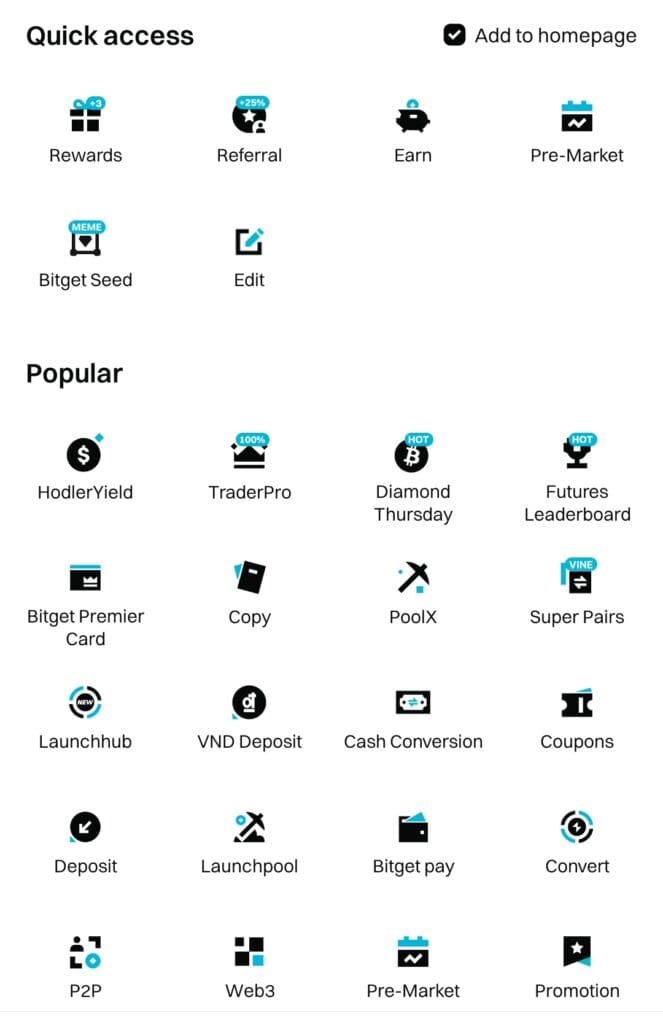
OKX also provides a user-friendly platform, but with a more complex interface. The mobile app is feature-packed, allowing traders to manage spot, futures, and staking in one place.
However, beginners might find it overwhelming due to its variety of advanced options and features. The app also supports DeFi and NFTs, providing a broader crypto experience.
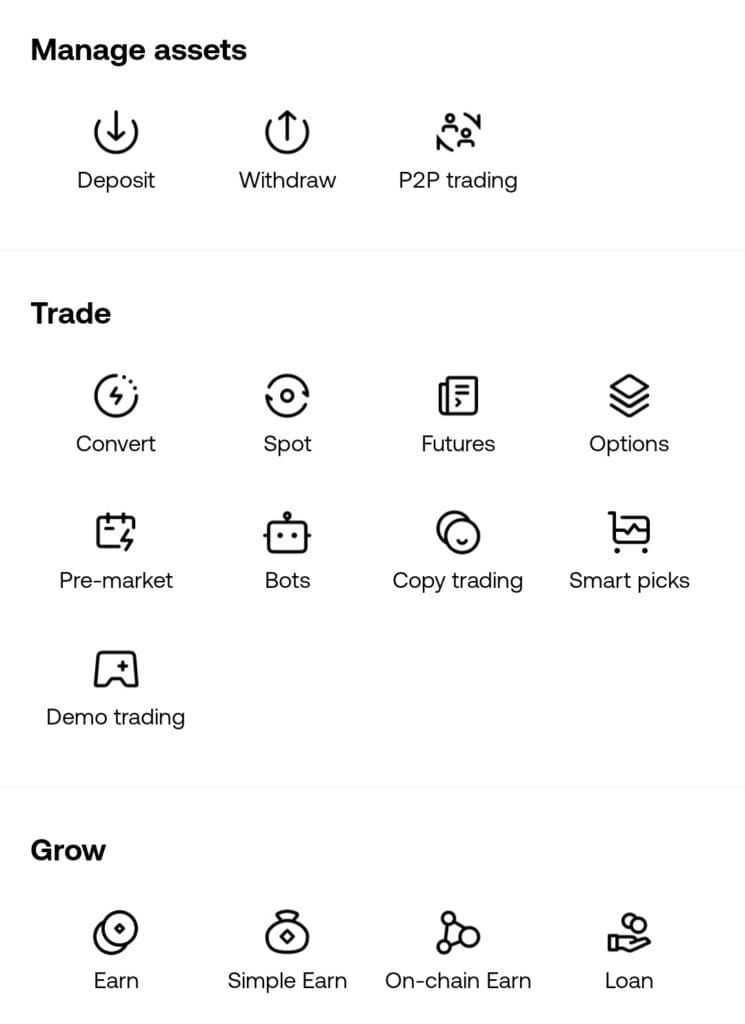
Overall, both platforms provide solid mobile experiences, but Bitget is more straightforward for beginners, while OKX’s mobile app caters better to experienced traders looking for more advanced features.
-
Cryptocurrency Selection
Bitget supports +800 cryptocurrencies, including top assets like Bitcoin, Ethereum, and various altcoins. It also features popular stablecoins like USDT and USDC.
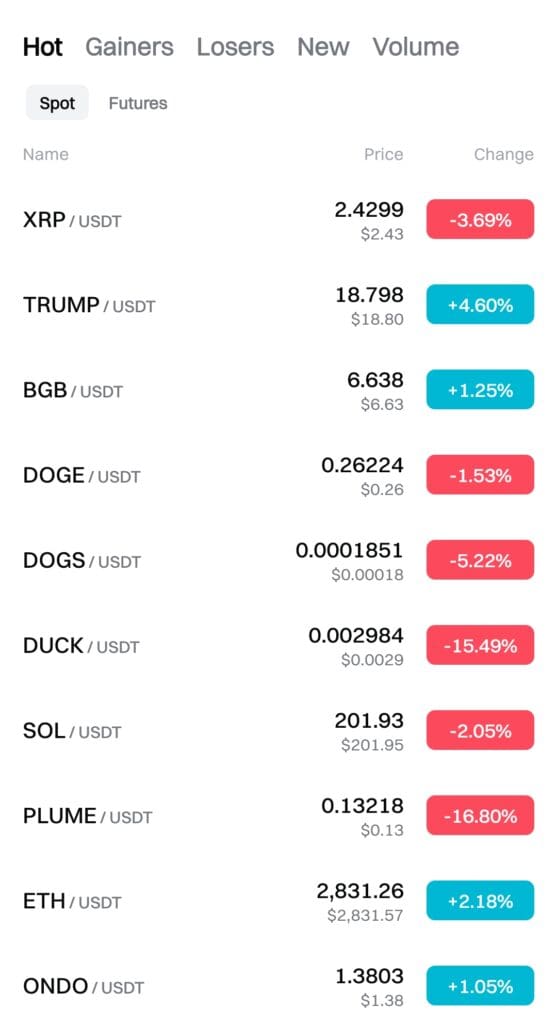
OKX offers a selection of +300 cryptocurrencies, including major assets like Bitcoin and Ethereum, as well as Solana and various stablecoins.
Additionally, OKX supports NFTs and offers access to a broader DeFi ecosystem, making it a good choice for Web3 enthusiasts.
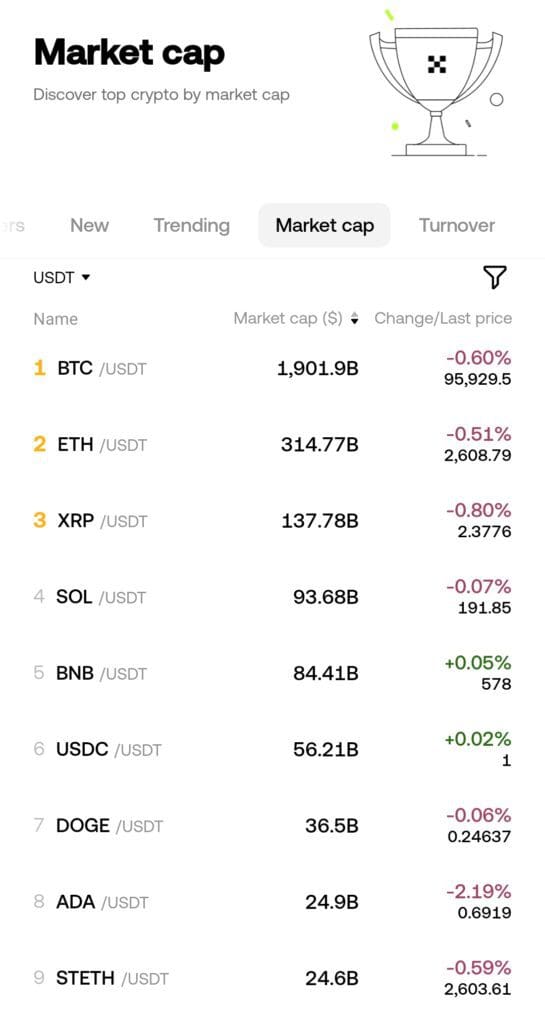
-
Trading Crypto Features & Experience
Bitget stands out with its futures trading, offering up to 125x leverage, which is ideal for traders seeking high-risk, high-reward opportunities.
It also features copy trading, allowing users to replicate the strategies of successful traders.
For those using Bitget’s advanced features, tools like stop-loss and take-profit orders help manage risk.
OKX provides comprehensive advanced trading features, including futures, perpetual swaps, and options with up to 100x leverage.
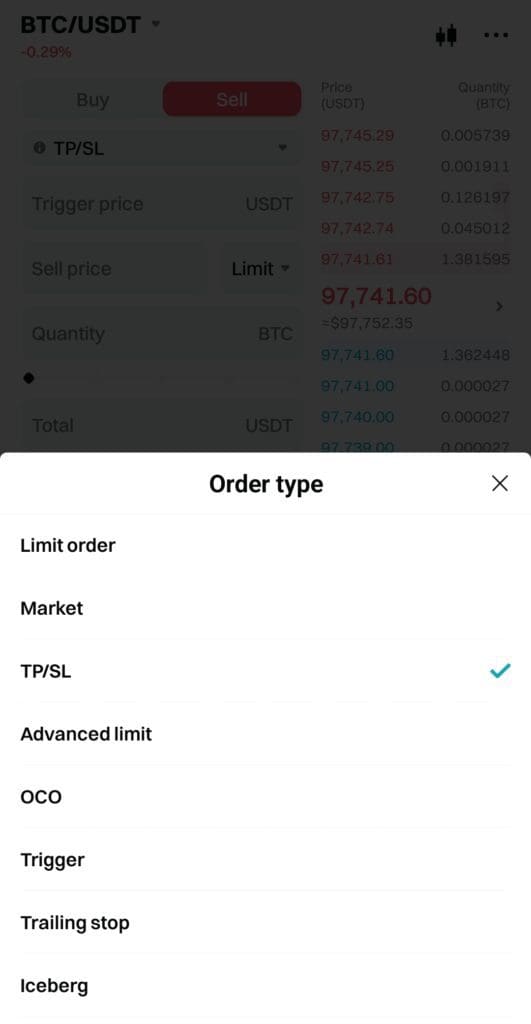
Its advanced charting tools, integrated with TradingView, make technical analysis easier for experienced traders.
Bottom line, both platforms offer advanced trading options, but OKX provides a broader range of tools, including trading bots and more advanced derivatives, making it the better choice for experienced traders.
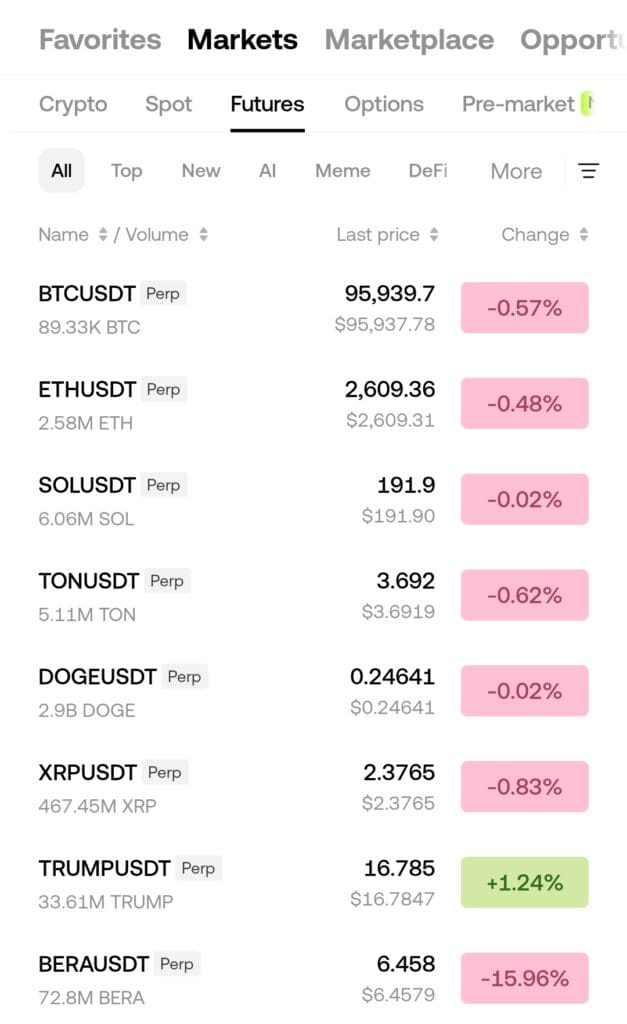
-
Staking Options and Rewards
OKX provides staking options for ETH, SOL, and other tokens through its On-chain Earn program. Users can stake as low as 0.01 ETH and receive rewards in BETH, which can be traded or used as collateral.
The platform implements MEV-boost to increase the chances of earning more rewards, and staking rewards are distributed daily.
Bitget offers a variety of staking options, including ETH, SOL, ATOM, and its native BGB token.
The BGB staking pool provides a fixed 5% APY with a 90-day lock-up period and a maximum stake of 2,000 BGB per user.
Additionally, Bitget offers DeFi staking, providing users with flexibility and a chance to earn passive income.
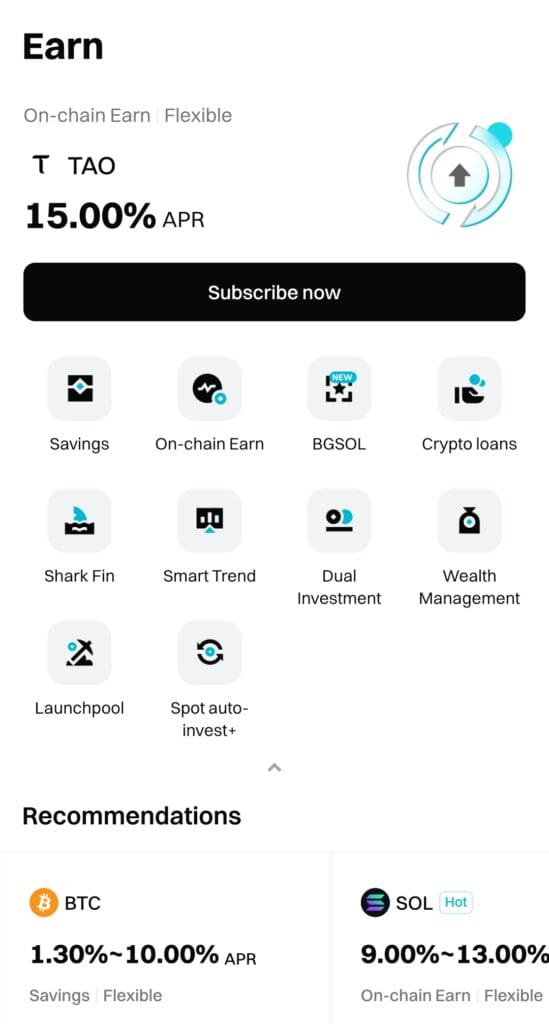
-
DApps and Web3 Integration
OKX leads in this area with robust Web3 and DApp integration, making it the go-to platform for users exploring the decentralized ecosystem.
Bitget does not currently offer DApps or Web3 integration, focusing primarily on crypto-to-crypto and fiat-to-crypto markets.
However, OKX supports Web3 integration, including access to decentralized finance (DeFi) protocols and NFTs. Its NFT marketplace and the ability to interact with various DeFi apps set it apart from Bitget.
-
Wallet Options
Bitget Wallet is a non-custodial Web3 wallet that supports over 100 blockchains and more than 20,000 DApps. It offers features like staking, instant swaps, and a DApp browser.
Users can stake BGB directly through the wallet and participate in exclusive reward programs.
OKX Wallet is a non-custodial Web3 wallet supporting multi-chain assets and DApps. It offers features like staking, DeFi access, and NFT support.
The wallet allows users to manage their crypto assets securely and interact with various blockchain applications.
-
Trading Bots and Automation
OKX provides a suite of trading bots, including grid trading, arbitrage, and futures bots. These bots are designed to help users automate their trading strategies and manage their portfolios efficiently.

Bitget offers trading bots that allow users to automate their trading strategies.
These bots can execute trades based on predefined conditions, helping users to capitalize on market opportunities without constant monitoring.
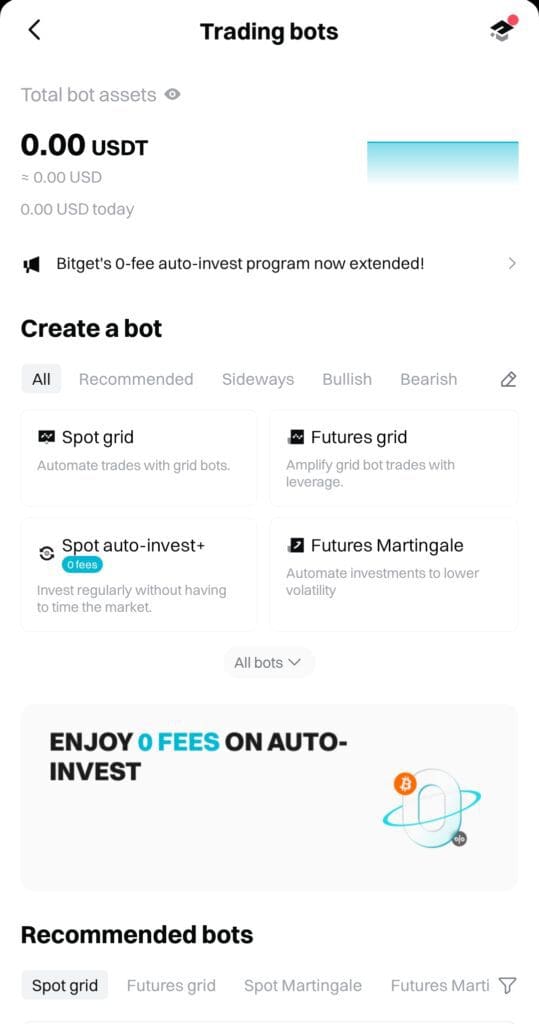
-
Security Measures And Past Hacks
Bitget employs industry-standard security measures, including encryption, two-factor authentication (2FA), and withdrawal whitelisting.
The platform has not been involved in any major security breaches or hacks, maintaining a strong reputation for user safety.
OKX implements robust security protocols, such as 2FA, cold storage for funds, and insurance policies to protect user assets.
While it has faced some regulatory challenges, it has not experienced significant security breaches affecting user funds.
Who Should Consider Bitget Exchange?
Bitget is best suited for experienced traders and those looking for advanced features such as futures trading and copy trading.
Advanced Traders: With leverage up to 125x for futures trading, Bitget appeals to high-risk, high-reward traders.
Copy Trading Enthusiasts: Ideal for users who want to replicate the strategies of top traders, making it accessible for beginners.
Global Traders: Available in over 170 countries, making it a good option for international traders.
Low-Fee Traders: Bitget offers competitive fees, especially for futures and margin trading, with discounts for BGB token holders.
Who Should Consider BitMart Exchange?
BitMart is ideal for beginner traders and those interested in an easy-to-navigate platform with a wide selection of assets.
Newer Traders: The simple interface and ease of use make it a good choice for beginners.
Altcoin Enthusiasts: BitMart offers a wide range of altcoins, appealing to users looking to diversify beyond Bitcoin and Ethereum.
Low-Cost Traders: With low trading fees and various fee discount opportunities, BitMart is attractive to budget-conscious traders.
Global Access: Available in many countries, but not the U.S., making it suitable for international users.
Bottom Line
Bitget excels for experienced traders who seek high-leverage futures, advanced tools like copy trading, and a global reach.
On the other hand, BitMart is more suited for beginners or those looking for an easy-to-use platform with a wide range of altcoins and competitive fees.
Both exchanges have their unique strengths, depending on user experience and trading preferences.
